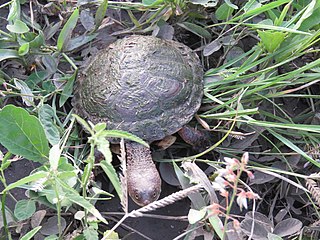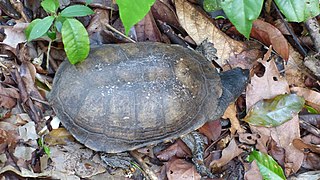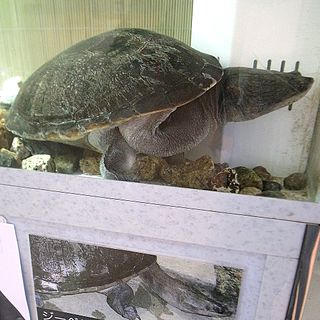
Heosemys is a genus of freshwater turtles in the family Geoemydidae. The genus Heosemys was split out of the related genus Geoemyda by McDowell in 1964.

The leopard tortoise is a large and attractively marked tortoise found in the savannas of eastern and southern Africa, from Sudan to the southern Cape Province. It is the only extant member of the genus Stigmochelys, although in the past, it was commonly placed in Geochelone. This tortoise is a grazing species that favors semiarid, thorny to grassland habitats. In both very hot and very cold weather, it may dwell in abandoned fox, jackal, or aardvark burrows. The leopard tortoise does not dig other than to make nests in which to lay eggs. Given its propensity for grassland habitats, it grazes extensively upon mixed grasses. It also favors succulents and thistles.

Chelodina, collectively known as snake-necked turtles, is a large and diverse genus of long-necked chelid turtles with a complicated nomenclatural history. Although in the past, Macrochelodina and Macrodiremys have been considered separate genera and prior to that all the same, they are now considered subgenera of the Chelodina, further Macrochelodina and Macrodiremys are now known to apply to the same species, hence Chelydera is used for the northern snake-necked turtles.

Macrochelys is a genus of very large freshwater turtles in the family Chelydridae, native to the Southeastern and Midwestern United States. Only a single extant species was recognized until 2014, when a study divided it into two, or possibly three species. These turtles are easily recognized by three distinct dorsal ridges with raised spikes.

The Chaco side-necked turtle is a species of turtle in the family Chelidae. It is found in Argentina, Paraguay, and possibly Bolivia. Its natural habitat is subtropical or tropical moist montane forests. The turtle possesses long horny spurs on its upper thighs. It is 18 cm in shell length. Like other members of its genus, the turtle buries itself in the mud when the streams run dry, a behaviour possibly parallel to the winter hibernating behaviours of turtles further north.

The Brazilian radiolated swamp turtle is a species of turtle in the Chelidae family endemic to Brazil.

Parker's snake-necked turtle is a species of turtle in the family Chelidae.

Elseya is a genus of large side-necked turtles, commonly known as Australian snapping turtles, in the family Chelidae. Species in the genus Elseya are found in river systems in northern and northeastern Australia and throughout the river systems of New Guinea. They are identified by the presence of alveolar ridges on the triturating surfaces of the mouth and the presence of a complex bridge strut.

The Western New Guinea stream turtle or New Guinea snapping turtle is a species of freshwater turtle in the Chelidae family. It is found in the Bird's Head Peninsula and the Bomberai Peninsula west of Cenderawasih Bay, and on the island of Waigeo of West Papua, Indonesia.

The East African black mud turtle, also known as the Pan terrapin, is a species of turtle in the family Pelomedusidae, native to eastern and southeastern Africa.

Hesperotestudo is an extinct genus of tortoise native to North and Central America from the Early Miocene to the Late Pleistocene. Species of Hesperotestudo varied widely in size, with a large undescribed specimen from the Late Pleistocene of El Salvador reaching 150 cm (4.9 ft) in carapace length, larger than that of extant giant tortoises. Historically considered a subgenus of Geochelone, it is now considered to be distantly related to that genus. Its relationships with other tortoises are uncertain. The exposed areas of the bodies of Hesperotestudo species were extensively covered with large dermal ossicles, which in life were covered in keratin. It has been suggested that species of Hesperotestudo were relatively tolerant of cold weather. Hesperotestudo became extinct at the end of the Pleistocene roughly co-incident with the arrival of the first humans in North America. There is apparently a site in Florida where one individual may have been killed that some suggested were evidence of butchering, although others suggested that the turtle was neither cooked nor does a ledge that was found near it date at the same time as it.

Elseya dentata, the northern snapping turtle, is a large aquatic turtle found throughout many rivers in northern Western Australia and the Northern Territory. It is one of three species in the nominate subgenus Elseya.

Chelodina (Chelydera) burrungandjii, the sandstone snake-necked turtle or Arnhem Land long-necked turtle, is a medium-sized turtle reaching carapace lengths of 316 mm. The species is found in the sandstone plateaus and escarpments and the plunge pools of Arnhem Land of the Northern Territory. The species had been long recognised as valid. However, it had been difficult to research due to the remoteness of its habitat. Efforts to breed this species in captivity had been largely unsuccessful, until National Aquarium Herpetologist Matthew Benedict lead a successful breeding project in 2021. The species occurs in proximity to Chelodina rugosa, to which it is closely related. For the most part the two species are parapatric in distribution. However, they do come together in limited locations such as plunge pools at the base of the escarpments. In these areas there is hybridization between the species.

The Myanmar brown leaf turtle is a species of Asian leaf turtle found in Myanmar.

Cyclemys enigmatica, also known as the enigmatic leaf turtle, is a species of Asian leaf turtle. It is found in the Greater Sunda Islands and the Malay Peninsula.

Elseya schultzei, commonly known as Schultze's snapping turtle, is a species of chelid turtle endemic to northern New Guinea.

Chelodina (Chelydera) kuchlingi, commonly known as Kuchling's long-necked turtle or Kuchling's turtle, is a species of freshwater turtle in the family Chelidae. The species is endemic to Australia.
The Turtle Taxonomy Working Group (TTWG) is an informal working group of the IUCN/SSC Tortoise and Freshwater Turtle Specialist Group (TFTSG). It is composed of a number of leading turtle taxonomists, with varying participation by individual participants over the years, some dropping out and others joining.

Centrochelys is a genus of tortoise. It contains one living species, the African spurred tortoise, native to the Sahel and adjacent areas. A number of fossil species have been attributed to this genus, but their placement in the genus is considered equivocal.

Scott A. Thomson is an Australian herpetologist, paleontologist, and taxonomist, specialising in turtles of the family Chelidae.



















